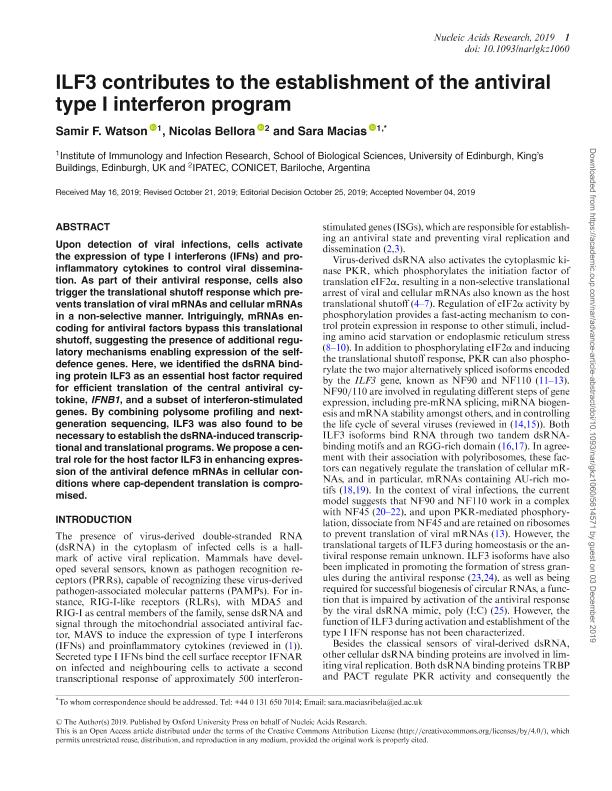Artículo
ILF3 contributes to the establishment of the antiviral type i interferon program
Fecha de publicación:
01/2020
Editorial:
Oxford University Press
Revista:
Nucleic Acids Research
ISSN:
0305-1048
e-ISSN:
1362-4962
Idioma:
Inglés
Tipo de recurso:
Artículo publicado
Clasificación temática:
Resumen
Upon detection of viral infections, cells activate the expression of type I interferons (IFNs) and pro-inflammatory cytokines to control viral dissemination. As part of their antiviral response, cells also trigger the translational shutoff response which prevents translation of viral mRNAs and cellular mRNAs in a non-selective manner. Intriguingly, mRNAs encoding for antiviral factors bypass this translational shutoff, suggesting the presence of additional regulatory mechanisms enabling expression of the self-defence genes. Here, we identified the dsRNA binding protein ILF3 as an essential host factor required for efficient translation of the central antiviral cytokine, IFNB1, and a subset of interferon-stimulated genes. By combining polysome profiling and next-generation sequencing, ILF3 was also found to be necessary to establish the dsRNA-induced transcriptional and translational programs. We propose a central role for the host factor ILF3 in enhancing expression of the antiviral defence mRNAs in cellular conditions where cap-dependent translation is compromised.
Archivos asociados
Licencia
Identificadores
Colecciones
Articulos(IPATEC)
Articulos de INSTITUTO ANDINO PATAGONICO DE TECNOLOGIAS BIOLOGICAS Y GEOAMBIENTALES
Articulos de INSTITUTO ANDINO PATAGONICO DE TECNOLOGIAS BIOLOGICAS Y GEOAMBIENTALES
Citación
Watson, Samir; Bellora, Nicolás; Macias Numa, Sara Magdalena del Valle; ILF3 contributes to the establishment of the antiviral type i interferon program; Oxford University Press; Nucleic Acids Research; 48; 1; 1-2020; 116-129
Compartir
Altmétricas




